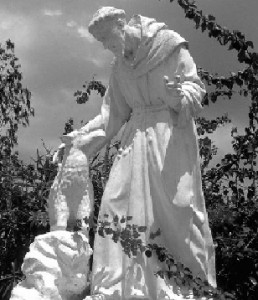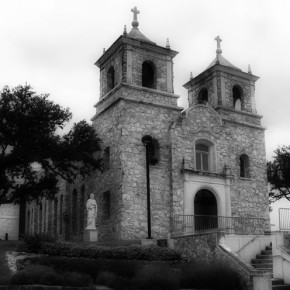Note: Rarely do I feel the need to comment on Stuck Key columns. But in reading this almost 20 years later, I find it rather odd. It’s pretty jumbled, probably because it’s the only thing I think I’ve written that doesn’t have cynicism, satire or bad jokes. It’s hard to trace what I was feeling at the time. I’ll post another note at the end…
What was that smell, the one that brought back more than memory, since exact pictures didn’t form in my mind? The smell carried feeling. It must have been the pews, for they are one common denominator in all churches—Catholic Churches at least.
And as I sat in the darkness of St. Peter’s Catholic Church, I drew the memories back on my own, called up my spiritual, and not so spiritual past. It had been about 10 years since I last entered a church, not counting weddings. I was raised a Catholic but abandoned the “faith” after discovering that a rational thought process tends to interfere with “faith,” in the religious sense of the word. “I’m not worried,” my mother told me somberly one day. “You will return to the Church someday.” And so I was there, in the little stone church on the hill in Boerne listening to the grumble and vibrations of an afternoon thunderstorm. Two elderly women kneeled in the darkness ahead of me. I inhaled the smell again, and it was pleasing. It was a sense of familiar, although I never experience it anymore. I wondered if the priests smell it, the musty odor that seems everywhere, so much so that I simply could not be sure of its exact source. I made note to ask a priest, although they surely have lived with it so long they don’t know either. The rain pattered the roof. I flipped through hymns and tried to sing their sound inside of me. The series of stained glass windows added color to the dim light. “What a grand religion,” I thought. Catholicism. It is more than a religion. It carries with it a transformation of societies, a long line of history that has wound its way around the globe. And I was raised into its folds, in a small suburban community near Dallas. What was the turning point? What made me leave? What made me sometimes outright shun the spiritual, the grace of religion and Catholicism in particular? I didn’t want to construct the reasons why. I did remember that I had been sincerely disappointed in my last parish, since it was a new congregation built around a gymnasium. Perhaps I found sanctity in stained glass, in statues, in frescos, in flickering candles, in the echo of the priest’s monotone words, “Through him, with him, in him,” as they bounced off a domed ceiling. The gymnasium—with hoops on each end—carried the sound of basketballs bouncing to a standstill and the smell of floor polish. I knew that the reliance on the more traditional relics would be a crutch, but nevertheless, I seemed to rely on them. And perhaps I left because of the influence of more aggressive religions that I began discovering through acquaintances, through studies. By aggressive, I mean that they preached hellfire and damnation without the savior of the soul. I remember a conversation in which I vehemently defended Pygmies. A Southern Baptist friend maintained that they would perish to eternal punishment by rejecting Christianity. It just didn’t make sense. They were Pygmies, a people who found spirituality in the forest. The arrogance of mankind to think that it can carry the absolute word of God! Mankind may represent him, but it certainly cannot judge for him. So by the mere fact that Catholicism was a religion, it was doomed in my mind. To be fair to other denominations, I do recall a long history of Catholic fanaticism, like the Spanish Inquisition. And in particular I vividly remember a passage of James Joyce describing the same type of “hellfire and damnation” preachings from Jesuits of his childhood:
…but the lake of fire in hell is boundless, shoreless and bottomless…And this terrible fire will not afflict the bodies of the damned only from without but each lost soul will be a hell unto itself, the boundless fire raging in  its very vitals. O, how terrible is the lot of those wretched beings! The blood seethes and boils in the veins, the brains are boiling in the skull, the heart in the breast glowing and bursting, the bowels a redhot mass of burning pulp, the tender eyes flaming like molten balls….Every sense of the flesh is tortured and every faculty of the soul therewith: the eyes with impenetrable utter darkness, the nose with noisome odours, the ears with yells and howls and execrations, the taste with foul matter, leprous corruption , nameless suffocating filth, the touch with redhot goads and spikes, with cruel tongues of flame.
its very vitals. O, how terrible is the lot of those wretched beings! The blood seethes and boils in the veins, the brains are boiling in the skull, the heart in the breast glowing and bursting, the bowels a redhot mass of burning pulp, the tender eyes flaming like molten balls….Every sense of the flesh is tortured and every faculty of the soul therewith: the eyes with impenetrable utter darkness, the nose with noisome odours, the ears with yells and howls and execrations, the taste with foul matter, leprous corruption , nameless suffocating filth, the touch with redhot goads and spikes, with cruel tongues of flame.
Had my Catholic pulpits subjected me to those same exhortations to commit to God, and warnings of the consequences if I did not, it would not have mattered. I still would have left. I am sure. A man’s threats are no match for the sense and sensibilities…and defending the Pygmies. A loud creak, a long one that lingered. Another feeling to explore. In the old Catholic churches, something always creaked, probably the pews again. Out of nowhere, a creak would break the silence, a shifting of wood that seemed to give life to the building. The house of God speaking without help from man. When silence set again, I remembered waiting for confessional as a child, trying to make a mental list of sins so that the redemption process would go as smoothly as possible. A creak would always interrupt my thoughts. And I’d begin staring at the ceiling, following the plaster through its curves and recesses, flowing around alcoves, winding around statues. Eventually, I would lose track, become mesmerized by the building itself, and when my turn came, I entered the confinement of a cramped booth without my list. Confession. Another glorious practice, although it’s considered an oddity by many other faiths. But what better road to redemption than admitting. It may not seem to carry the same weight as actually making amends with those you have wronged. But the spoken word, even though to a stranger (both priest and God, since God is often a stranger to many) is to hear the wrong. Hearing is a remarkable tool for acknowledging, and acknowledging leads to being true to one’s self. And thus, the truth sets ye free. Only in recognizing the truth can you forgive yourself, and that is the key. Asking for God’s forgiveness is to allow your own. And only in this freedom can sincere forgiveness be sought from others. Of course, I didn’t realize any of this when as a child I spoke, “It has been four months since my last confession.” The confessional at the time only conjured up thoughts of its oddities. Sitting hidden before a priest. Whispered secrets. The sound of the screen sliding open and the anticipation of having to speak. No, the realization of forgiveness came from other studies.
Asking for God’s forgiveness is to allow your own. And only in this freedom can sincere forgiveness be sought from others. Of course, I didn’t realize any of this when as a child I spoke, “It has been four months since my last confession.” The confessional at the time only conjured up thoughts of its oddities. Sitting hidden before a priest. Whispered secrets. The sound of the screen sliding open and the anticipation of having to speak. No, the realization of forgiveness came from other studies.
It came from doing wrong over and over again. It came from distraught days sitting and listening to the wind. It came from staring at street traffic, hung over, drinking coffee in cafes. It came from loving another, so much so that a higher knowledge of repentance was worth it to maintain love with them and all. If only they—the devout Catholics who taught us children—had concentrated on why we did what we did instead of making sure we knew all the rules, all the peculiar traditions, the ritual. I had once read that the reason for eating fish during lent traced its origin to a political situation involving negotiations between a pope and Italian fishermen. Whether this absurdity is true or not didn’t matter. The practice had lost meaning for me without a good grounding of the why. So ironically, ritual drew me and repelled me. However, I did take one valuable thing with me in this rather dry learning of faith—St. Francis. I took his name for my Confirmation, even though many of my peers laughed at it because it sounded somewhat girlish. Although Francis lived a quite remarkable life, one filled with all sorts of fantastic miracles and quests of faith, I merely appreciated the man that could talk to the animals, summon the wolves. Even now the sight of his statue—a bird perched on his shoulder, and one on the hand, often with small animals at his side—will cause me to pause and reflect, admire. Perhaps it was simply his magical ability to communicate with the natural world that attracted me the most. But I also found a calling in his humility. And I can almost recite his prayer (regardless of its origin) from memory:
 Lord, make me an instrument of your peace. Where there is hatred, let me sow love; where there is injury, pardon; where there is doubt, faith; where there is despair, hope; where there is darkness, light; and where there is sadness, joy. Divine Master, grant that I may not so much seek to be consoled as to console; to be understood as to understand; to be loved as to love. For it is in giving that we receive; it is in pardoning that we are pardoned; and it is in dying that we are born to eternal life.
Lord, make me an instrument of your peace. Where there is hatred, let me sow love; where there is injury, pardon; where there is doubt, faith; where there is despair, hope; where there is darkness, light; and where there is sadness, joy. Divine Master, grant that I may not so much seek to be consoled as to console; to be understood as to understand; to be loved as to love. For it is in giving that we receive; it is in pardoning that we are pardoned; and it is in dying that we are born to eternal life.
The storm ended and the more parishioners arrived and kneeled. I wondered if I would return to the church and to the Church. Whatever happens to me, I thought, I will always strive to live by Francis’s ideals.
Note: What the hell did I mean by this: “It came from loving another, so much so that a higher knowledge of repentance was worth it to maintain love with them and all.” Finally, the original copy I had somehow had the word torn off after the final “Francis’s.” I have no idea what it was, so I added “ideals.” Hmmmm.

